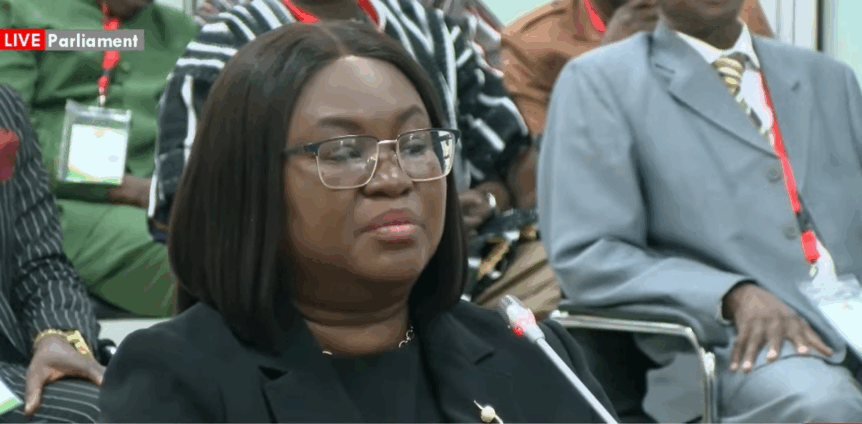What was meant to be a constitutional exercise in oversight and institutional integrity took a controversial turn during the parliamentary vetting of Justice Hafisata Ameleboba when the Minority Leader of Ghana’s Parliament, Alexander Kwamena Afenyo-Markin, was accused of veering off the bounds of professional interrogation into personal and politically charged territory. The session, held by the Appointments Committee, was expected to offer the nominee an opportunity to defend her judicial philosophy and background, but quickly descended into a combative exchange as Afenyo-Markin turned the spotlight on procedural grievances and allegations of bias within the vetting process itself. Justice Ameleboba, a nominee to the Supreme Court bench, is among seven judges of the Court of Appeal nominated by President John Dramani Mahama in April 2025 following the suspension of Chief Justice Gertrude Torkornoo. Her vetting, like others before it, was anticipated to focus on legal competence, ethical integrity, and constitutional fidelity.
However, the hearing was dominated instead by impassioned interjections, procedural clashes, and what several observers described as thinly veiled personal attacks. The Minority Leader, in a tone that many have described as unusually combative, openly questioned the legitimacy of the hearing’s timing and accused the committee’s Clerk and leadership of orchestrating a process that was neither transparent nor consultative. In a widely circulated video from the hearing, Afenyo-Markin can be seen interrupting Committee Chairman Bernard Ahiafor with a brusque admonition, saying, “Don’t raise your voice! Chairman, lower your voice!” The moment, which triggered brief chaos in the chamber, forced the Chairman to suspend proceedings for five minutes to restore order. Although disagreements during vetting are not uncommon, this particular encounter was viewed by many as unprecedented in its personal intensity and public theatricality.
Throughout the session, the Minority Leader repeatedly diverted from Justice Ameleboba’s professional credentials and judicial philosophy to register complaints about procedural impropriety. He accused the Clerk of the committee of intentionally ambushing members with late-night notices and sudden scheduling, arguing that members were not given adequate time to prepare for such critical scrutiny of the nominee. According to him, the Minority was being undermined and “treated with contempt.” This allegation was met with swift rebuke by Majority MPs, some of whom demanded a retraction and an apology. Under pressure, Afenyo-Markin later offered a reluctant apology to the Clerk the following day, but by then, the damage had arguably been done. Observers noted that this confrontational posture from the Minority Leader risked shifting the focus from the nominee to parliamentary politics, compromising the core purpose of the vetting exercise. Rather than engaging Justice Ameleboba on matters related to the Constitution, judicial reasoning, or her past judgments, the line of questioning, or lack thereof, raised concerns among legal experts and civil society organizations about the professionalism and integrity of the vetting process. Legal analyst Kwabena Yeboah described the session as “a missed opportunity for substantive engagement,” noting that Justice Ameleboba’s capabilities were overshadowed by political bickering.
The vetting proceedings also revealed deeper fault lines between the Majority and Minority in Parliament over the process of appointing new justices to the Supreme Court. The current wave of nominations, comprising seven in total, has already sparked controversy, coming at a time when the Chief Justice herself has been suspended and faces an investigative committee. Many in the opposition view the nominations as part of an attempt to restructure the Judiciary in a way that favours the Executive, an accusation the Presidency has strongly denied. Afenyo-Markin’s conduct at the vetting appeared to reflect broader frustration with what the Minority perceives as an attempt by the Majority to railroad judicial appointments without proper consensus. Public reaction has also been swift and divided.
Some political commentators have praised Afenyo-Markin for speaking boldly against what they see as a rubber-stamping exercise by the Majority. Others, however, argue that the Minority Leader’s tone and approach did not serve the national interest. Social media commentary, particularly on platforms like Twitter and Reddit, has been scathing in parts. One widely shared post read: “That wasn’t vetting. That was a political campaign speech disguised as oversight. The nominee deserved better.”
The Ghana Bar Association and other legal interest groups have so far remained measured in their public responses, but privately, some senior members have reportedly expressed concern about the politicisation of the Judiciary. According to one source within the legal fraternity, vetting processes should be conducted in a manner that commands public confidence and reflects the dignity of the office being sought. “What happened during Justice Ameleboba’s hearing undermines that goal,” the source stated.
Despite the storm, Justice Ameleboba maintained a calm and composed demeanour throughout the hearing, choosing not to respond to the confrontational tone adopted by some members of the committee. Her silence in the face of personal insinuations has been interpreted by some as judicial restraint and maturity, traits deemed essential for a Justice of the apex court. It remains to be seen how the committee will vote on her nomination, but her prospects may now be affected as much by the politics surrounding her appearance as by her qualifications.
What was intended to be a forum for rigorous legal scrutiny became, instead, a stage for political theatre. The Minority Leader’s performance during the vetting of Justice Hafisata Ameleboba has left the public with as many questions about the role of Parliament in judicial appointments as about the nominee herself. As the Judiciary continues to transform high-profile suspensions and multiple appointments, oversight processes must preserve their institutional integrity. Only then can public confidence in democratic institutions, including Parliament and the Judiciary, be preserved.

